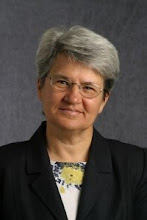
Although far from competent, I am becoming a campanologist under the expert tutelage of John Harper.
Last year, one of our business professors informed me that the local All Saints Anglican Church was in search of individuals interested in learning how to ring bells. I naturally thought of handbells. So, imagine my surprise when, the first night of training, I encountered six long ropes suspended from the ceiling. I was being introduced to a very special form of church bell ringing, very much a British tradition started centuries ago.
Over 90% of all the bell towers in the world - over 5,000 with ringable bells - are located in England thus rightfully earning it the name, the 'Ringing Isle.' Besides calling the faithful to prayer, church bells were employed as an ancient form of communication - announcing weddings, funerals, arrival of dignitaries and warning of invasion during World War II.
Church bells are mounted in a strong frame made of wood, iron or steel. The largest bell is in St Paul's, London, weighing 16.7 tons. The heaviest full-circle ringing bell, at 4.1 tons, is the tenor at Liverpool Cathedral. They are sounded by a group of generally three to six persons pulling on ropes and because of the bell's weight, the ringing must be based on technique rather than on brute force. (Think of the film Four Weddings and a Funeral.)
Change ringing is quintessentially English, combining music, math, sports and tradition. This method, ruled by numbers and patterns, allows church bells to ring in a series of mathematical patterns called 'changes'. This form of bell ringing creates 'tunes' and so sound different from bells in other traditions. The only other places in the world where bells are rung in this manner are in places where the English once dominated: e.g. Scotland, Wales, Ireland, Africa, India, Australia and New Zealand.
The library of change ringing recordings compiled by John Ketteringham demonstrate the wonderfully rhythmic tunes which can be made to sound merry, sad or dignified depending upon the occasion and can be found at http://cccbr.org.uk/bellrecordings/.
I hope that you enjoy these melodious sounds as much as I enjoy ringing (playing in the 'band'). And, next time you're in England, do stop and listen to the sweetness of the church bells.

No comments:
Post a Comment